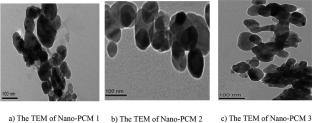Enhanced energy storage via one-step preparation of Cuo-nanosalt
Abstract
Molten salts are widely used as thermal energy storage materials in solar thermal systems; however, their limited thermophysical properties, particularly low specific heat capacity, restrict their performance. This study uses a novel one-step method to prepare nanoparticles directly in the base salt under different preparation conditions. We have extended the examination of various preparation conditions from our previous study. The precursor material was copper sulfate uses to produce copper oxide (CuO) nanoparticles. The concentrations of the prepared CuO nanoparticles keeps fixed at 1 wt.%. The preparation processes of CuO nanoparticles were at different times and temperatures. The results reveal a significant influence of the preparation method conditions on the enhancement of thermophysical properties of nanosalt. The one-step method achieved the highest increase in specific heat capacity, with improvements of 32.63% in the solid phase and 21.74% in the liquid phase compared to the base salt without any additives. Additionally, sensible heat storage improved by 8.623% using the one-step nanosalt formulation. More notably, latent heat showed a remarkable increase of 76.46% for the one-step CuO-nanosalt compared to the pure binary salt. Furthermore, the one-step method is a cost-effective way to save on the cost and time of preparations by 89.27%. These findings underscore the crucial role of the preparation technique in determining the thermal behavior of nanosalts. Transmission electron microscopy (TEM) analysis confirmed the presence of CuO nanoparticle agglomeration in samples prepared via the one-step method, which may contribute to the observed enhancements. This work provides new insights into optimizing nanosalt formulations for more efficient thermal energy storage systems.


 求助内容:
求助内容: 应助结果提醒方式:
应助结果提醒方式:


